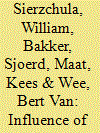|
|
|
Sort Order |
|
|
|
Items / Page
|
|
|
|
|
|
|
| Srl | Item |
| 1 |
ID:
181761


|
|
|
|
|
| Summary/Abstract |
Internal Carbon Pricing (ICP) is a tool for companies to internalize negative external effects caused by their carbon emissions and to prepare themselves for a low-carbon economy. Globally, an increasing number of companies adopts ICP. Yet, many German firms do not use it yet. This paper explores why German companies do not adopt ICP and which barriers hinder the proper implementation of the instrument drawing on the concept of eco-innovation. Eighteen semi-structured interviews were conducted and analyzed using a structuring qualitative content analysis. The findings show that small companies face particularly strong challenges to mobilize the financial, technical, and informational resources necessary for the implementation of ICP. Internal carbon price levels similar to existing external carbon pricing schemes fail to unfold a steering function, because these prices are currently too low. Further difficulties arise due to the complexity of correctly accounting for GHG emissions and setting the right carbon price. The paper highlights the need for stringent external carbon policies on a national and European level, for more external information on ICP, and for the facilitation of cooperation between companies in order to increase the adoption rate and the efficacy of ICP in Germany.
|
|
|
|
|
|
|
|
|
|
|
|
|
|
|
|
| 2 |
ID:
192839


|
|
|
|
|
| Summary/Abstract |
Scarce evidence postulates the drivers of eco-innovation in Latin American Countries. This paper aims to contribute empirically to the literature on drivers of eco-efficiencies in this region. We use the last year available in the new LAIS dataset -Latin American Innovation Survey- and apply multivariate probit models. Results show that drivers in this region can be divided into three groups: common, frequent, and occasional. The first one includes market and regulatory factors which affect the three countries; frequent drivers are some technological push drivers whose influence is substantial although only in some countries; and the last one refers to those drivers that have a sporadic effect on eco-efficiencies, such as training and cooperation. Differences also are found distinguishing by type of innovation -product and process, radical and incremental- and by efficiencies -energy, material, and environmental-.
|
|
|
|
|
|
|
|
|
|
|
|
|
|
|
|
| 3 |
ID:
133088


|
|
|
|
|
| Publication |
2014.
|
| Summary/Abstract |
Electric vehicles represent an innovation with the potential to lower greenhouse gas emissions and help mitigate the causes of climate change. However, externalities including the appropriability of knowledge and pollution abatement result in societal/economic benefits that are not incorporated in electric vehicle prices. In order to address resulting market failures, governments have employed a number of policies. We seek to determine the relationship of one such policy instrument (consumer financial incentives) to electric vehicle adoption. Based on existing literature, we identified several additional socio-economic factors that are expected to be influential in determining electric vehicle adoption rates. Using multiple linear regression analysis, we examined the relationship between those variables and 30 national electric vehicle market shares for the year 2012. The model found financial incentives, charging infrastructure, and local presence of production facilities to be significant and positively correlated to a country×s electric vehicle market share. Results suggest that of those factors, charging infrastructure was most strongly related to electric vehicle adoption. However, descriptive analysis suggests that neither financial incentives nor charging infrastructure ensure high electric vehicle adoption rates.
|
|
|
|
|
|
|
|
|
|
|
|
|
|
|
|
| 4 |
ID:
162317


|
|
|
|
|
| Summary/Abstract |
Despite the global aviation industry's strong endorsement of a switch to aviation biofuels, fossil fuel remains the dominant energy source for air travel. Drawing on a multiple case study of 58 organizations in the emerging aviation biofuels industry relevant to Australia, Germany, and the USA, we unpack the lessons learned from this stalling industry. First and foremost, we identify a key difference in industry outlooks and corresponding strategic mindsets. Specifically, the two outlooks—industry optimism and industry pessimism—seem to correspond to specific strategic mindsets. Whereas industry optimists (1) stressed diversification, (2) were demand-driven in their decisions about R&D, and generally (3) had a learning orientation to innovations, industry pessimists emphasized the need for (1) premium pricing, (2) government intervention, and (3) economies of scale as key drivers of industry development and growth. We also found geographic differences in industry outlooks among biofuel entrepreneurs and other stakeholders in Australia, Germany, and the USA. Through our findings, we offer insights for policymakers and other industries seeking to transition to renewables.
|
|
|
|
|
|
|
|
|
|
|
|
|
|
|
|
|
|
|
|
|